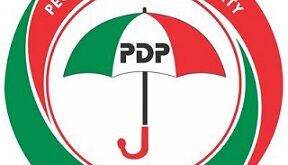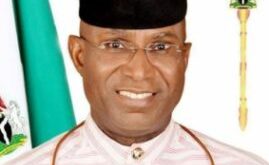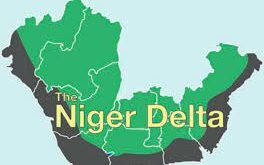By Ehichioya Ezomon
Recently, the seemingly urbane and easy-going former Imo State Governor Achike Udenwa (1999-2007), chewed two issues at the same time: Nigerian politicians’ propensity to buying their way into elective office; and alleged interference of the ruling All Progressives Congress (APC) in the affairs of the opposition, principally the Peoples Democratic Party (PDP).
Udenwa, featuring on Edmund Obilo’s ‘State Affairs’ show, a political podcast, as reported by Vanguard on March 2, 2025, posited that, “Nigeria is in a situation where rich politicians can buy the Independent Electoral Commission (INEC), the Police, and the Army to win elections.”
The Udenwa claim isn’t something new in Nigeria where “anything goes.” But it’s concerning the failure of the podcaster(s) to unravel if Udenwa, ex-Minister of Commerce and Industry (2008-2010), is sqeakly clean in the political arena, and as governor for eight years.
According to Udenwa, “Our society has grown to such a level where, if you say, ‘vote for me,’ I am (we are) no longer asking, ‘what can you do? What are your antecedents? What type of character do you have?’ We don’t ask such questions again. And, of course, even if I don’t vote for you, you can buy your way through if you have the right amount of money.”
Could politicians buy the INEC, the Police, the Army, and the voters? Udenwa replied, “You can buy everybody,” and affirmed that elections in Nigeria are “about buying, but that the practice must be curbed for the correct leaders to emerge.”
This is where the podcaster(s) failed the journalistic test – that’s if they’re really journalists, as it’s difficult to identify ones among social media posters, who parade as such – as there’s a couple of begging questions to ask:
• “Did Udenwa buy his way to the seat of Government in Owerri, capital city of Imo State, for his two terms of four years each in 1999 and 2003, in that order? • “On good conscience, as a Christian, could Udenwa affirm (the Bible) that he didn’t deploy Imo State’s resources and assets to prosecute, especially his re-election as governor?
Udenwa’s answers to the questions could’ve elicited further probing into his adherence to accountability, probity and transparency while he’s in government as a governor, and as a minister, respectively!
It’s apt, though, that Udenwa’s blanket allegation of politicians buying their way into office is self-deprecating, without exonerating himself or the PDP from blame, or pointing fingers at only his opponents and opposing parties!
Politicians – more than the Military – are Nigeria’s real problems due to their “do-die-die” kind of politics, right from the First Republic (1960-1966) that ended in a conflagration partly traced to the elections in the Western Region, which the Military capitilised on to disrupt civil rule from 1966 to 1979 (13 years), and from 1983 to 1999 (16 years), totaling 29 years.
Politicians go into elections with a mindset of winning; no room for losing. That’s why they deploy all means legal, unlawful and unorthodox, including huge financial outlays to bribe party members; buy votes from voters; secure assistance of electoral officials and security agents to aid rigging; and arm thugs to snatch or destroy ballot materials, and maim or kill opponents to gain the upper hand.
When they’re defeated by their more adept opponents in electoral manipulation and malfeasance, politicians mostly refuse to admit failure, but go to the election tribunals to complain about their “stolen mandate,” and pursue the petitions through the judicial chain: from the High Court to the Appeal Court and the Supreme Court, the final arbiter in legal matters.
We’ve seen cases, where defeated candidates go back to relitigate the apex court decided matters at the high courts, which boldly entertain such overreach that aims to undermine the hierarchical and pyramidal judicial powers and pronouncements therefrom.
Losing at the poll and in the courts means millions or billions going down the drain. But victory at the poll or in the courts gives politicians an avenue to recoup and defray their election expenses directly from the public purse or via third parties in the form of inflated contracts for returns from the money earmarked for such projects.
Because of monetisation of elective offices in Nigeria – and the immense powers and influence that officeholders wield – politicians exploit deliberately-created loopholes in the operating rulebooks that reward the waywards in government.
Hence they dip their hands in the public till, make away with billions in local and foreign currencies, stash some in safe havens – which their yet-unborn generations can’t exhaust in their lifetimes – and deploy more on fleet of exotic vehicles, private jets, choice properties, and frolics across the globe.
When the law seldom catches up with politicians, it comes to little or nothing, as lawyers and the courts connive to dismiss or drag, for years, the allegations leveled by unstrengthened anti-corruption agencies, which may also compromise and file weak charges against the treasury looters.
From the forgoing, one tends to agree with Chief Udenwa that politicians with deep pockets can buy all the stakeholders involved in the processes of election in Nigeria, to get into office, and that, “the practice must be curbed for the correct leaders to emerge.”
But as the Apostle Paul observes in Romans 3:23: “All have sinned and come short of the glory of God.” So, it’s time Udenwa and the political class went down on their knees, to seek forgiveness from God for their electorally-monetised sins against the Nigerian people, and pledge to sin no more!
Even as he admitted PDP’s internal problems, Udenwa, a member of the party’s Board of Trustees (BOT), said, “There are external hands trying to destroy the PDP through internal sources,” without mentioning the names, and added, “We are still battling the problem, and I believe PDP will not be destroyed.”
Characteristically, Udenwa regurgitated the talking point of the PDP – (and the entire opposition, which’s a new megaphone in former Kaduna State Governor and ex-Minister of the Federal Capital Territory (FCT), Abuja, Mallam Nasir el-Rufai, a mind bender, who can spin any issue to his advantage) – to blaming others, but themselves for failure to adhere to the dictates of their party’s constitution and run their affairs in line with democratic principles and standards.
Their main punching bag is the APC, which dislodged them from power in 2015, just 16 years into their dream 60-year suzareignty over Nigeria. Since then, the who-is-who in the PDP hasn’t said anything tangible until they blame their self-induced and inflicted problems and division at the national and sub-national levels on the APC and its leadership.
Why do PDP and its members play the ostrich: bury their heads in the sand, and turn around to blame the APC as the “bird of prey” for spotting their uncovered hides? They know the genesis of their problems, and won’t place the blame where it belongs, but fish for a scapegoat elsewhere!
For instance, is it the APC that influenced or coerced former Vice President Atiku Abubakar to lead seven PDP governors of Jigawa, Kano, Sokoto, Niger, Rivers, Kwara and Adamawa to walk out of the Special National Delegates Convention at the Eagle Square in Abuja on August 31, 2013?
Leaving the convention venue, Atiku, the governors, the PDP Acting National Chairman, Abubakar Kawu Baraje and some National Assembly members moved to the Yar’Adua Centre for an emergency meeting, and addressed a press conference in protest of the convention organisers’ disqualification of over 50 of the 75 aspirants – presumed loyal to opponents of second term-seeking President Goodluck Jonathan – from vying for the 17 available positions in the National Working Committee (NWC) of the party.
Subsequently, they formed a splitter group, named New Peoples Democratic Party (nPDP); and Atiku and five of the governors of Adamawa, Kano, Sokoto, Kwara and Rivers defected and dissolved the nPDP into the opposition APC, which defeated then-ruling PDP and President Jonathan in 2015.
Fast-forward to 2023, and history somehow repeated itself, only this time in a reverse scenario but with the same Atiku as the lead actor. Returning again to the PDP pre-2019 poll – and clinched the presidential ticket, but was defeated by President Muhammadu Buhari for his second term in office – Atiku breached the PDP constitution during the 2023 election cycle.
The PDP constitution forbids the presidential candidate or president and party chairman to emerge from the same region, North or South. Still, Atiku from the North insisted that Dr Iyorcha Ayu, a northerner and former Senate President (1992-1993), remain in office as chairman until the end of the 2023 election.
At the PDP convention/presidential primary in Abuja for the 2023 poll, Atiku defeated then-Rivers State Governor Nyesom Wike (now Minister of the Federal Capital Territory (FCT), Abuja) to the second spot. The consensus of the PDP leaders was for Atiku to pick Wike as his running mate, but Atiku chose then-Delta State Governor Ifeanyi Okowa.
An incensed Wike – who, along with other four aggrieved PDP governors of Abia, Benue, Enugu and Oyo, had formed a group nick-named G-5 (PDP-G5) – pounced on the issue of zoning of the National Chairmanship to the South, as a precondition to work for the Atiku-Okowa ticket at the February 25, 2023, presidential election.
With Atiku sticking to his guns, and backing Ayu to retain the PDP chair – the G-5 governors worked against him, and he lost the five states in 2023, thus reinforcing the axioms: “Those who are too clever sometimes overreach themselves,” and “Don’t cut your nose to spite your face.” Had Atiku let go the PDP chairmanship to the South, the G-5 governors would’ve worked for his ticket, for enhanced chances at the poll.
Has the PDP learned any lessons from its missteps in 2015 and 2023? NO! The party has failed to mend especially the 2023 cracks in its platform, which’ve widened and deepened, such that there’s pandemonium at a recent meeting of the BOT (which Udenwa belongs) in Abuja, following a clash by members of the Atiku and Wike factions.
The PDP and its members should face their problems squarely, and stop blaming the APC as stirring internal crisis in their fold. The leadership should respect the party’s constitution, and enthrone internal democracy based on the rule of law and inclusiveness of all members! Enough of the blame game!
*Mr Ezomon, journalist and media consultant, writes from Lagos, Nigeria. Can be reached on X, Threads, Facebook, Instagram and WhatsApp @EhichioyaEzomon. Tel: 08033078357.
 PH Mundial – Port Harcourt Online Newspaper News Across The Region
PH Mundial – Port Harcourt Online Newspaper News Across The Region





